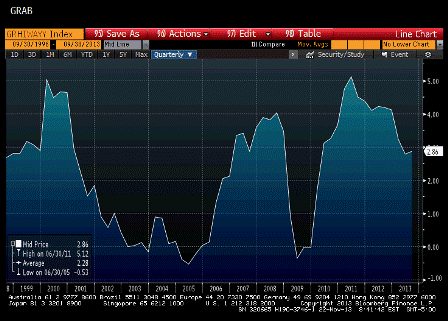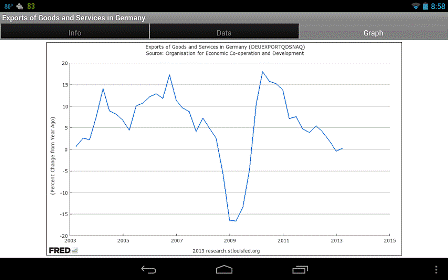Monthly Archives: November 2013
New Economic Perspectives on the Government Budget, Deficits, and the National Debt – YouTube
Claims and labor force growth rate
Chicago pmi looking good, consumer confidence up
Go rust belt!
Maybe I’ll finally get a good price for the condos I bought in the early 80’s when I lived there…
Chicago PMI
Highlights
Monthly growth in composite activity in Chicago remains exceptionally strong, at 63.0 for this month’s reading vs an even stronger 65.9 in October. Strength is centered where it should be, in new orders which are at a robust 68.8. The prior reading, at 74.3, was a 9 year high. Production slowed in the month but remains very strong at 64.3 vs 71.1.
Employment is a special standout in today’s report, up 3.2 points to 60.9 which is the highest reading in more than 2 years. Inventories, at 61.1, show a sudden build as Chicago businesses prepare to fill orders. Backlog orders are growing strongly, deliveries are slowing, and price inputs are rising — all consistent with strong activity.
This report, which covers all areas of the Chicago economy, points to another month of solid growth for the coming ISM reports on manufacturing and non-manufacturing. The Dow is moving to opening highs following today’s report.
Consumer Sentiment
Market Consensus before announcement
The Reuter’s/University of Michigan’s consumer sentiment index slipped to 72.0 for the early November reading versus 73.2 for final October and versus 75.2 in the early October reading. The latest result was the 7th straight dip going through both early and final readings back to final July. The erosion continues to be centered in expectations which were at 62.3, down steadily from July’s peak at 76.5. Current conditions have also been coming down but less so, to 87.2 in the preliminary November reading versus a peak of 99.7 in early July.
Mortgage purchase applications down year over year again
No sign of life here yet. It’s now been down year over year for quite a while.
Multi family permits were reported up yesterday, which helps, but note multi family units are a lot cheaper than single family starts.
Durables/cap ex just released and looking soft as well.
The 4-week average of the purchase index is now down about 5% from a year ago.
Hussman view of equity valuation
What’s new here is somehow Hussman has picked on the idea that corporate profits fall as the federal deficit falls. He stops short of suggesting we need a higher federal deficit, of course.
After all his endless inane out of paradigm raving against federal deficits it might take him a few months to reverse course. ;)
Nor does he mention the well known Levy Profit Equation from maybe 75 years ago that shows same, or Wynne Godley’s work or any of the MMT sources that he no doubt perused regarding sector balances.
An Open Letter to the FOMC: Recognizing the Valuation Bubble In Equities
By John Hussman
Fannie and Freddie plan gets Washington attention
First, it’s a step in the wrong direction. My proposal is for the FFB to offer fixed rate financing with no prepay penalty to the agencies at the govt’s ‘policy rate’ for said mortgage funding.
Second, they are only doing this because after decades of successfully getting people into houses who arguably wouldn’t have been there, presumably serving numerous aspects of public purpose, they suffer ‘losses’ when in 2008 govt policy causes 8 million people to lose their jobs pretty much all at once.
Nor are those offering to ‘help’ doing out of charity…
Fannie and Freddie plan gets Washington attention
November 25 (FT) — Bob Corker, the Republican senator co-sponsoring a bill to wind down Fannie Mae and Freddie Mac, has become the first senior politician to express openness to a hedge fund proposal to take over core operations of the US mortgage finance giants. He found the plan interesting, he added, saying that it validated his legislation because it would work only in a reformed housing finance system. The Fairholme plan would eliminate Fannie and Freddie, and transfer their future mortgage guarantee business to two new private sector companies. The new entities would be capitalised with assets equivalent to the $34.6bn face value of Fannie and Freddie’s preferred shares, plus the proceeds of a $17.3bn rights issue, potentially backed by private equity.
household debt
Just noticed this. The question is whether it was proactive/desired and ongoing or one time/forced due to sequester and FICA hike income reductions.
“Household debt jumped US$127 billion in the third quarter, the biggest increase since the first quarter of 2008. The rise was across the board as Americans went into greater debt to buy everything from houses to cars to schooling. Household debt is now growing faster than both gross domestic product and disposable income, returning to the pattern that drove both economic growth and serial bubbles in the past decade.”
(Thanks Edward Harrison)
German export growth and household income growth
German domestic demand better hurry up and improve before there’s no household income growth left to support it. Or export growth.
That said, Germany output and employment has been outperforming the rest of europe, much the way Texas and North Dakota may outperform in the states. When the federal deficit is too small as evidenced at the macro level by unemployment and excess capacity in general, it doesn’t necessarily have the same effect on all members.
German Household Income Y/Y:

Full size image
German Exports Y/Y:

Full size image
John Carney: What I Read
Thanks JC!
John Carney: What I Read
I’ll open my email to see what my colleagues at CNBC have been emailing me about, what sources have been emailing me. I’ll read through what I consider the big macro economics blogs, like Pragmatic Capitalism, or Mosler Economics, The Money Illusion, and occasionally Paul Krugman, to see what they’re talking about.
